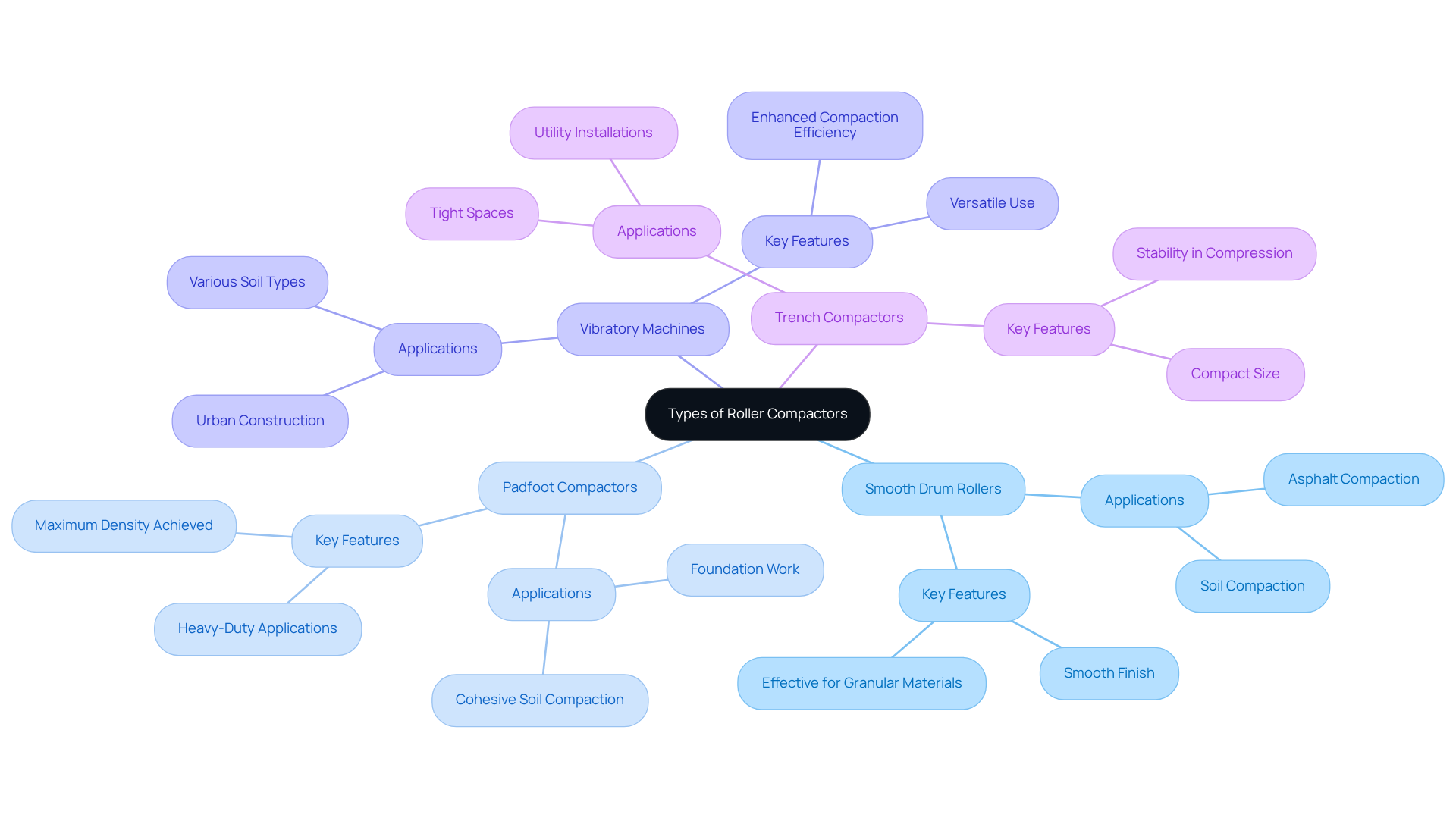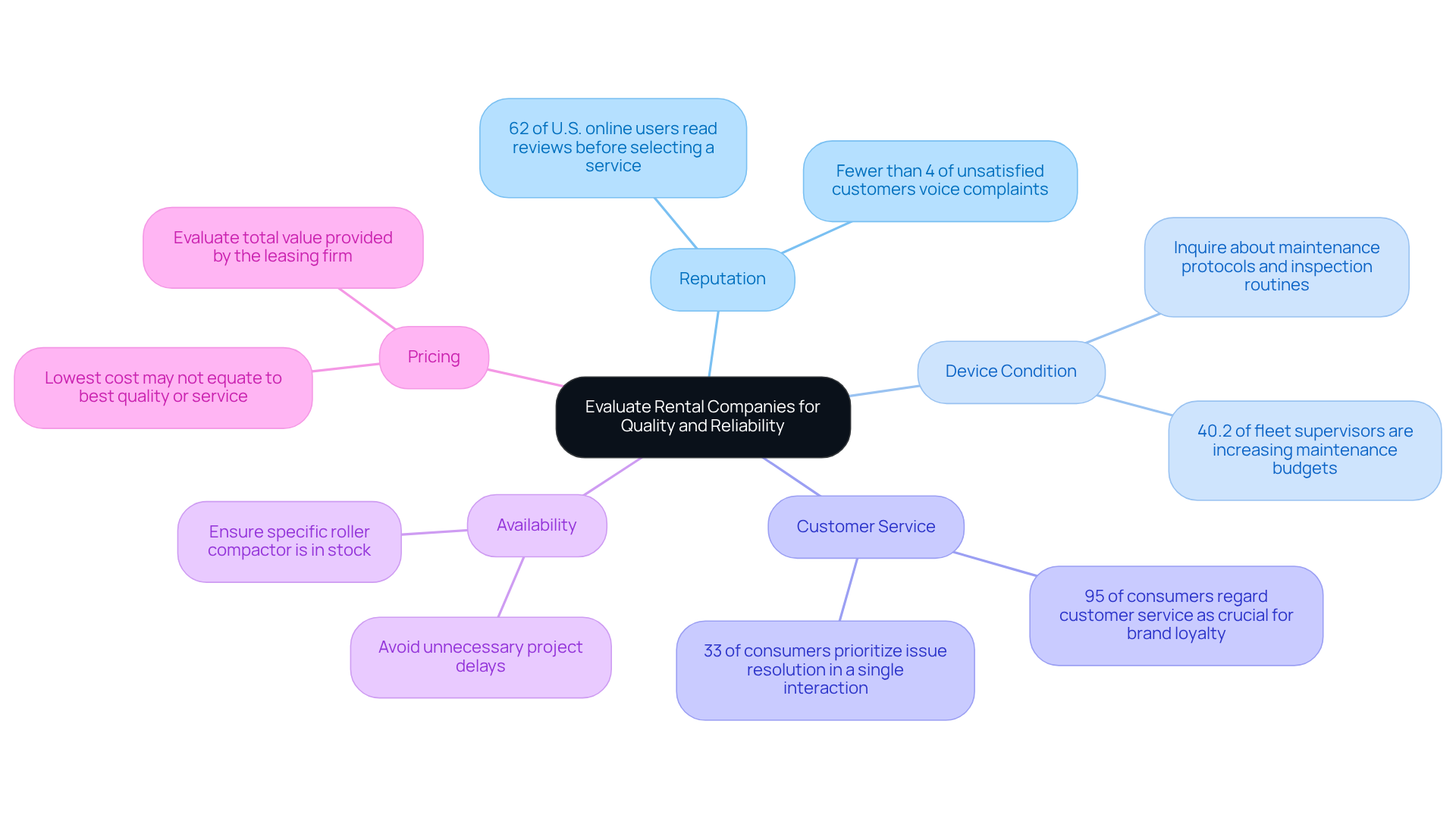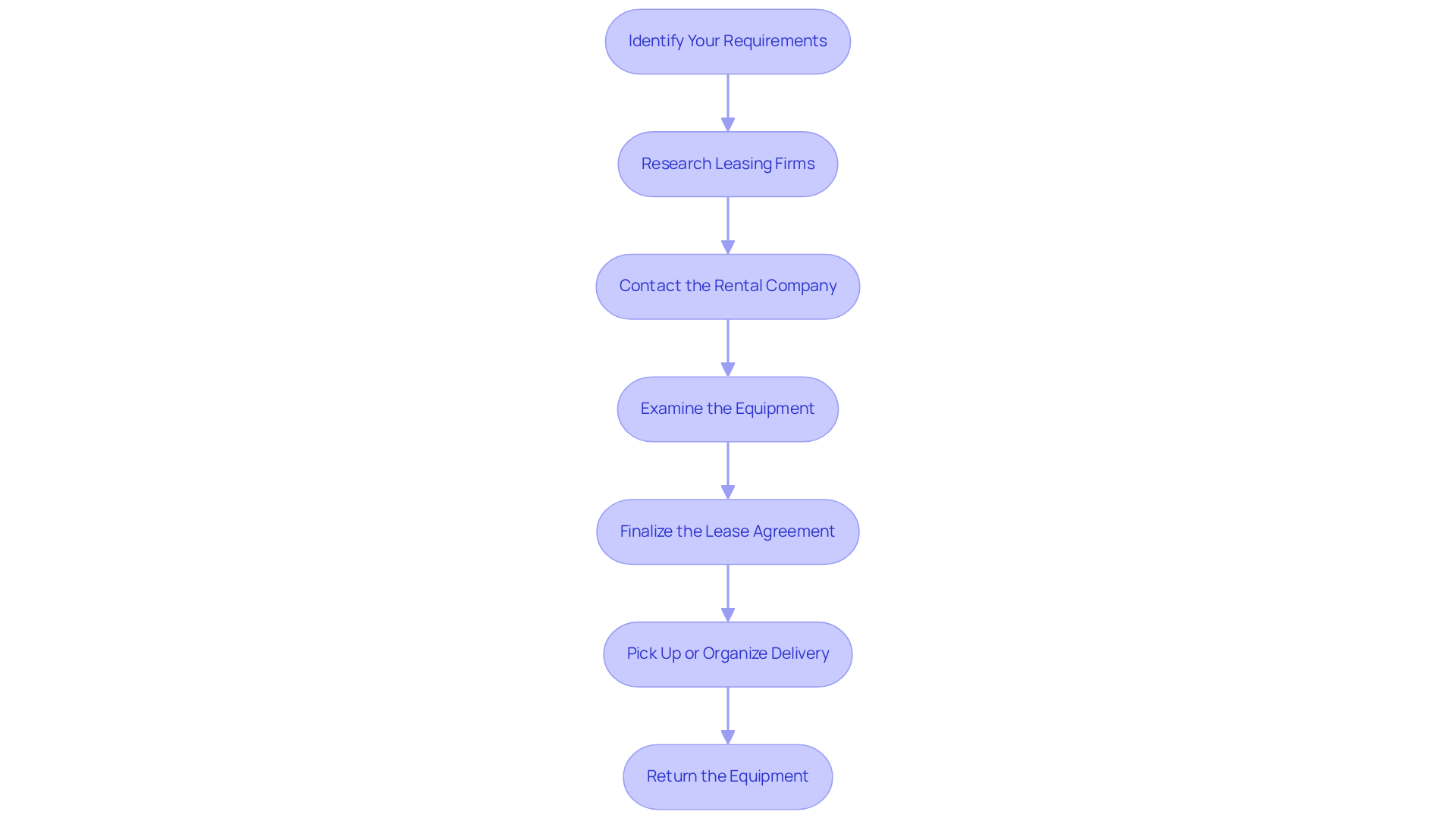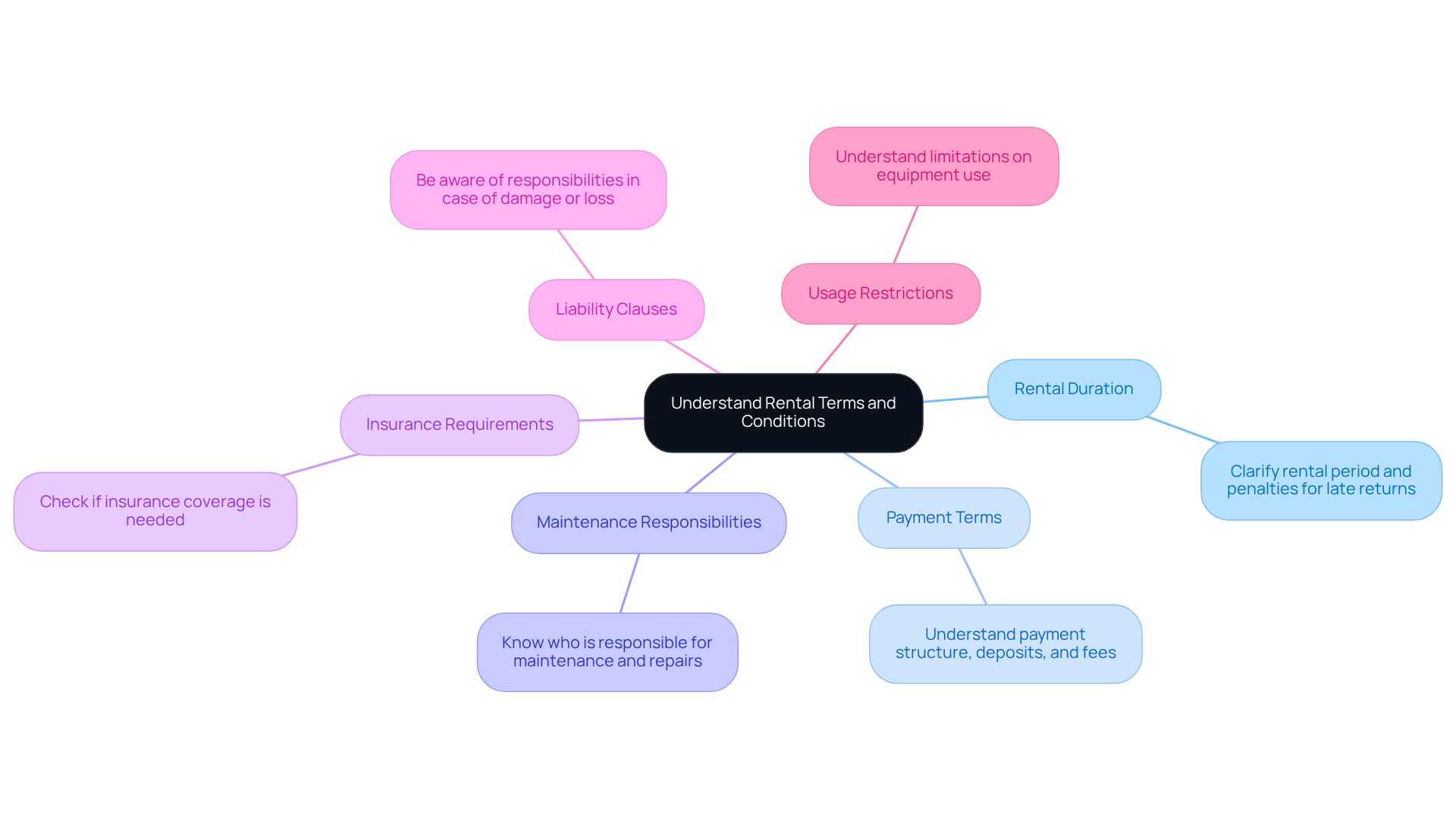Overview
This article presents a systematic approach to renting a roller compactor, beginning with the identification of project requirements. It emphasizes the importance of researching rental companies and understanding rental terms. Detailed descriptions of various compactor types are provided, alongside critical factors to evaluate rental firms. This comprehensive process empowers users to make informed decisions for their construction projects, ensuring reliability and quality in their equipment choices.
Key Highlights:
- Smooth Drum Rollers are ideal for asphalt and soil compaction, providing a smooth finish for road construction.
- Padfoot Compactors are designed for cohesive soil compaction, suitable for heavy-duty applications like foundation work.
- Vibratory Machines enhance compaction through vibration, making them versatile for various soil types and urban projects.
- Trench Compactors are compact and designed for use in tight spaces, ensuring stability for utility installations.
- Evaluate rental companies based on reputation, device condition, customer service, availability, and pricing to ensure quality and reliability.
- The rental process involves identifying requirements, researching firms, contacting companies, inspecting equipment, finalising agreements, and arranging for pickup or delivery.
- Understand rental terms including duration, payment structure, maintenance responsibilities, insurance requirements, liability clauses, and usage restrictions to enhance the rental experience.
Introduction
Understanding the nuances of renting a roller compactor is essential for the success of any construction project. With various types of compactors available, each designed for specific applications, selecting the right equipment is crucial for achieving optimal results.
Navigating the rental process, however, can be daunting. What factors should be considered to ensure a reliable and efficient experience? This guide demystifies the steps to successfully rent a roller compactor, empowering readers to make informed decisions that align with their project needs.
Identify the Types of Roller Compactors Available for Rent
When considering how to rent a roller compactor, it is essential to understand the various types available, each tailored for specific applications.
-
Smooth Drum Rollers are optimal for asphalt and soil compaction, delivering a smooth finish crucial in road construction. Their design allows for effective compaction of granular materials, making them a popular choice in the industry. According to market data, the vibratory compactor segment held the largest market share in 2020, underscoring its effectiveness across various applications.
-
Padfoot Compactors feature pads that penetrate the soil, excelling in compacting cohesive soils. They are particularly suited for heavy-duty applications, such as foundation work and road base preparation, where maximum density is required. Industry leaders, such as Caterpillar, emphasize the significance of utilizing the appropriate type of equipment to achieve optimal compaction outcomes.
-
Vibratory Machines utilize vibration to enhance compaction, making them versatile and effective across various soil types. Their ability to compact materials efficiently renders them a staple in construction projects, especially in urban settings where space is limited. A recent case study on Caterpillar's Cat CW16 pneumatic compactor illustrates advancements in vibratory technology that enhance efficiency and performance.
-
Trench Compactors are specifically designed for compressing earth in tight areas; their compact size allows for efficient functioning in limited spaces, ensuring stability in utility installations and other underground endeavors.
Assessing your undertaking requirements will assist in identifying which type of compactor aligns best with your needs, ensuring optimal performance and efficiency in your construction efforts. EZ Equipment Rental provides a varied selection of these compaction machines, making it easy to rent a roller compactor with adaptable leasing conditions and competitive rates to meet your project requirements.

Evaluate Rental Companies for Quality and Reliability
When evaluating rental companies to rent a roller compactor, it is crucial to consider several key factors that will influence your decision-making process.
- Reputation: Investigate reviews and testimonials from previous customers to assess the company's reliability. Statistics indicate that 62% of U.S. online users read reviews before selecting a service, underscoring the significance of a solid reputation. Furthermore, it's important to acknowledge that fewer than 4% of unsatisfied customers actually voice their complaints, which highlights the necessity for proactive feedback collection to gauge true customer satisfaction.
- Device Condition: Ensure the company prioritizes the maintenance of its tools. In the leasing sector, efficient upkeep methods are essential, as 40.2% of fleet supervisors are increasing budgets to prolong machinery lifespan. Inquire about their maintenance protocols and inspection routines to confirm that the equipment is in optimal condition, thereby reducing the risk of downtime on your projects.
- Customer Service: A knowledgeable and responsive customer support team can significantly enhance your leasing experience. Research shows that 95% of consumers regard customer service as a crucial factor in brand loyalty, making it essential to select a company that values customer support. Moreover, for 33% of consumers, the most important aspect of a positive customer service experience is resolving their issues in a single interaction, which emphasizes the need for effective issue resolution.
- Availability: Ensure that the company has the specific roller compactor you need to rent in stock and ready for leasing. This guarantees that you can proceed with your project without unnecessary delays, keeping your timeline intact.
- Pricing: While comparing lease rates, remember that the lowest cost may not always equate to the best quality or service. A thorough assessment of the total value provided by the leasing firm is essential for making an informed decision. The growth of the construction equipment rental industry reflects an increasing demand for quality services, making it imperative to evaluate value beyond mere pricing. By considering these factors, you can make a confident choice that aligns with your project needs.

Follow the Step-by-Step Rental Process for Roller Compactors
To rent a roller compactor effectively, follow this structured approach:
- Identify Your Requirements: Begin by evaluating the specific demands of your project, including the type and size of compactor necessary for optimal performance. With the construction machinery leasing market projected to expand considerably, understanding your requirements is crucial for making informed decisions. Leasing equipment like roller compactors can enhance your efficiency and lower costs, as evidenced by the rising demand for such rentals in Dallas.
- Research Leasing Firms: Utilize online resources and local directories to identify reputable leasing firms in your area, prioritizing those recognized for quality service and reliability. As the leasing market size surged by nearly $11 billion in 2023, many firms, including EZ Equipment Rental, are adapting to meet the growing demand, offering a variety of tools that can elevate your project's efficiency.
- Contact the Rental Company: Reach out to your selected company to inquire about equipment availability, ask pertinent questions regarding specifications, and clarify leasing terms to ensure a seamless process. According to industry experts, effective planning and analytics are vital for successful equipment leasing. EZ Equipment Rental provides comprehensive information on the benefits of how to rent a roller compactor, ensuring you make the best choice for your project.
- Examine the Equipment: If feasible, visit the rental site to inspect the roller compactor in person, confirming it meets your requirements before finalizing the rental. This step can help prevent potential issues during your project. Understanding the advantages of renting equipment can further inform your decision-making process.
- Finalize the Lease Agreement: Carefully review and sign the lease agreement, ensuring you fully understand all terms and conditions to avoid any surprises. Clear communication with the rental company can prevent misunderstandings, ensuring a hassle-free rental experience.
- Pick Up or Organize Delivery: Decide whether to collect the equipment personally or arrange for delivery to your work site, considering logistics and timing. The convenience of delivery can save valuable time, allowing you to focus on other essential tasks.
- Return the Equipment: After completing your project, return the compactor according to the agreed terms, ensuring it is in the same condition as when rented to avoid additional charges. Proper maintenance during the rental period can help extend the equipment's lifespan, aligning with current industry trends and reinforcing the cost-effectiveness of renting over purchasing.
Are you ready to rent a roller compactor? Contact EZ Equipment Rental today to explore our options and get started on your project!

Understand Rental Terms and Conditions
Before signing a rental agreement, it is crucial to understand the following terms and conditions:
- Rental Duration: Clarify the rental period and any penalties for late returns to avoid unexpected charges.
- Payment Terms: Understand the payment structure, including deposits, leasing rates, and any additional fees that may apply.
- Maintenance Responsibilities: Know who is responsible for maintenance and repairs during the rental period to ensure the equipment remains in optimal condition.
- Insurance Requirements: Check if you need to provide insurance coverage for the machinery, as this can protect you from potential liabilities.
- Liability Clauses: Be aware of any liability clauses that outline your responsibilities in case of damage or loss, safeguarding your interests.
- Usage Restrictions: Understand any limitations on how the equipment can be used, including operational guidelines and safety protocols, to ensure compliance and safety.
By familiarizing yourself with these terms, you can make informed decisions that enhance your rental experience.

Conclusion
Renting a roller compactor is a strategic move that can significantly enhance the efficiency and effectiveness of construction projects, provided the right steps are followed. It is crucial to understand the types of compactors available, evaluate rental companies for quality and reliability, and adhere to a structured rental process. These essential components ensure a successful rental experience. By being informed and prepared, project managers can make decisions that align with their specific needs and project goals.
The article outlines four crucial steps:
- Identifying the appropriate type of roller compactor
- Assessing rental companies based on reputation, equipment condition, customer service, and availability
- Following a detailed rental process
Each of these elements plays a vital role in achieving optimal compaction results while minimizing potential downtime and costs. Additionally, understanding rental terms and conditions is paramount to avoid unexpected surprises and ensure a smooth transaction.
Ultimately, being proactive in the rental process not only streamlines project timelines but also fosters a more effective working environment. Those looking to rent a roller compactor should take the time to research and choose wisely, as the right equipment and rental company can make all the difference in the success of a construction project. Engaging with reputable rental firms like EZ Equipment Rental can provide the necessary support and resources to ensure that projects run smoothly and efficiently.
Frequently Asked Questions
What are the main types of roller compactors available for rent?
The main types of roller compactors available for rent include Smooth Drum Rollers, Padfoot Compactors, Vibratory Machines, and Trench Compactors.
What is the purpose of Smooth Drum Rollers?
Smooth Drum Rollers are optimal for asphalt and soil compaction, delivering a smooth finish that is crucial in road construction and effectively compacting granular materials.
What applications are Padfoot Compactors best suited for?
Padfoot Compactors are designed for heavy-duty applications, excelling in compacting cohesive soils, making them ideal for foundation work and road base preparation where maximum density is required.
How do Vibratory Machines enhance compaction?
Vibratory Machines utilize vibration to enhance compaction, making them versatile and effective across various soil types, especially in construction projects located in urban settings with limited space.
What are Trench Compactors specifically designed for?
Trench Compactors are specifically designed for compressing earth in tight areas, allowing for efficient functioning in limited spaces and ensuring stability in utility installations and other underground endeavors.
How can I determine which type of compactor is best for my project?
Assessing your undertaking requirements will help you identify which type of compactor aligns best with your needs, ensuring optimal performance and efficiency in your construction efforts.
Where can I rent roller compactors?
EZ Equipment Rental provides a varied selection of compaction machines for rent, offering adaptable leasing conditions and competitive rates to meet your project requirements.




